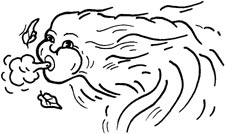 Carr-Tunes ~ by Steve Carr
Carr-Tunes ~ by Steve Carr
Shiver Me Timbers
The trouble began way up in Eastern Canada. A nasty low-pressure system dropped south and collided with a big high-pressure front moving slowly across the Great Plains. This clash of the Titans coincided with a rare alignment of low and high altitude winds, translating into two earth-shaking days of wind throughout Chesapeake Country. The wind blew out of the west at a steady 35mph, with gusts over 50mph, creating havoc and confusion in its path.
Blowing in the Wind
Going to an environmental conference in Baltimore that first morning was like trying to drive in a wind tunnel. As I left the house, I figured I’d drive up I-97; I quickly thought better of that idea when I considered the prospect of having to take one of the high bridges over the Severn. No way. I opted for Ritchie Highway. That proved to be a bad decision, too, because the wind had knocked out the power to Arnold and Severna Park, meaning the traffic lights at every intersection were not working. Morning rush hour traffic was backed up to the moon.
When I finally made it to the Maritime Institute of Technology Training Center, up near BWI, I parked in a big lot over by the main building. I didn’t realize my truck door would have to open against the wind. That certainly wasn’t happening. The door wouldn’t even budge. So I climbed out the passenger side and ran for cover.
 All day at the conference, the building sounded like it was going to come apart at the seams; people kept looking up at the ceiling with much trepidation, wondering if the wind was going to push its way inside.
All day at the conference, the building sounded like it was going to come apart at the seams; people kept looking up at the ceiling with much trepidation, wondering if the wind was going to push its way inside.
When the conference ended, I made for the side door, almost getting launched like a piece of paper when I stepped outside. Turning directly into the wind, I literally came to a dead stop, unable to move forward against the gale force. The sun was shining brightly, but I felt like I was trying to walk through the middle of a tornado. I pulled myself along a handrail like
I was climbing up a mountain on Belay.
As I drove home, getting whipped around from lane to lane, I thanked the Lord I had taken my kayak off the top of the truck. Otherwise, I would have lost it off the back like a depth charge, and there would have been an Old Town Loon doing a solo run down the Baltimore Beltway.
I avoided the Severn River Bridge after hearing on the radio that a tractor trailer had almost been blown over the side. Suddenly, the variable message boards along the highway, warning trucks to stay off the Key Bridge, made perfect sense.
The lights were still out in Severna Park, and there was a comical bumper car dance underway at Jumpers Hole Road. I opted for Benfield Road, figuring there were no lights.
Several decades later I limped home, only to discover that the power to my house had gone out, too. After being without juice for six days after the pre-Isabel storm, and then another five days from Isabel, I thought it a bit old. I feel like I’m living in Somalia or Iraq during wartime. I don’t know about you, but I’m starting to get the feeling that BGE’s power grid is held together with chewing gum and rubber bands.
What the Wind Did
Being without power when the wind is cranking at a steady 40mph and the windchill is down to about 16 degrees is a whole different ball game from our summertime fun. After cooking hotdogs on Sterno, I went upstairs and climbed into my down sleeping bag for the night. It was so cold in my house I felt like I was camping out.
Lying there in the dark I had trouble getting to sleep, so I listened to the wind song outside. And what a performance it was. My house didn’t exactly shake, but I could definitely feel it tremble. The wind came in rolling waves of sound. It roared, whined and thundered its way across the land and through the trees. At times it sounded like it was almost screaming in a high-pitched wail. There were lulls in the action every few minutes or so. The night would go silent, only to be steamrolled by the rushing percussion of freight trains and crashing surf. This was a storm with some serious staying power
The next morning when I awoke, the wind had calmed down a bit to a mere 20mph. The consequences of the day’s previous howlathon were immediately obvious.
First off, all the leaves were gone. Usually it takes weeks for all of the leaves around here to drop after they have turned brown. But the windstorm had blown them all away. The trees had been stripped bare in the course of a single day. Where did all the leaves go? I’m guessing out into the Bay and heading for Ireland.
The second thing that I noticed was the river. The wind had blown the Severn into the main stem of the Bay, and the shorelines were exposed at perpetual low tide. As if a water sheet had been pulled back for all to see, the floor of the river was laid open like an ancient book.
I threw on my Wellies and went for a walk. Beachcombing opportunities like this are rare indeed.
The volume of trash was overwhelming. Every glass item known to civilization was lying there whole or in pieces in the mud, along with tires, lawn chairs, boat cushions, Styrofoam coolers and a seemingly endless variety of plastic junk. The bottom of the Severn looked like a landfill.
But there were also some wonderful things lying there, just waiting to be discovered. I found a small, gray-quartz arrowhead that had been lost by a prehistoric Indian — probably a Piscataway hunter — at about the same time that our European ancestors were crawling out from underneath the stink of the Black Death. Down by the North Severn dock, I came upon several pieces from an historic clay white stem pipe that had been discarded by someone way back in colonial times. And over by the Old Severn River Bridge, I unearthed an old milk bottle from the Annapolis Dairy Company that used to be located on West Street. Not exactly buried treasure, I guess, but neat stuff nevertheless.
On land, the windstorm’s aftermath was equally visible. Southern Anne Arundel roads were littered with tree branches like after an ice storm, which is no doubt coming. Around Annapolis, wind-blown trash hung in the trees like Christmas ornaments. Everywhere I went, it looked like the world had been turned upside down and inside out.
The November Windstorm of 2003 was one for the books. And that’s saying something for a place like Annapolis, where wind is a large part of our lives. Annapolis isn’t known as the Sailing Capital of the World just because it’s near the water. We live in a place on the globe where cold air from the north often collides with warm wet weather from the south, and when they meet, they have a wild party with lots of wind. So we’re used to our wind in big doses. But when you get wind gusts of 50mph for over 24 hours straight, you’re talking Tropical Storm or the Polar Express.
We survived yet another climatic catastrophe in this incredible year of natural disasters. Over the last year or so, our weather has turned extreme and unruly. Scientists, of course, predicted this exact meteorological chain of events would accompany the first throes of global warming. Meanwhile, the Bay just keeps on rising.
What’s next, do you suppose?
to the top

 Carr-Tunes ~ by Steve Carr
Carr-Tunes ~ by Steve Carr

 All day at the conference, the building sounded like it was going to come apart at the seams; people kept looking up at the ceiling with much trepidation, wondering if the wind was going to push its way inside.
All day at the conference, the building sounded like it was going to come apart at the seams; people kept looking up at the ceiling with much trepidation, wondering if the wind was going to push its way inside.